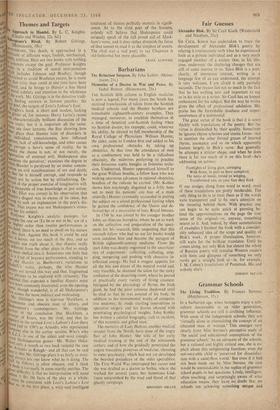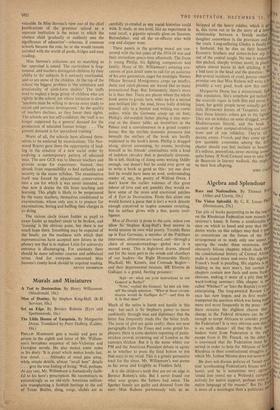Grammar Schools IN a barbarian age, when teenagers enjoy a
sub- culture inaccessible to an older generation, grammar schools- are still a civilising influence. With some of the independent schools, they are `virtually alone in transmitting the concept of an educated man or woman.' This emerges very clearly from Miss Stevens's perceptive study of `the social and eduCational assumptions of the grammar school.' As an advocate of the schools, but a rational and highly critical one, she is ex- plicit about this enlightening function; even the not-very-able child is 'preserved for dissatisfac- tion with a candyfloss world.' But even if it had not been made out by Miss Stevens, the case would be unmistakable in the replies of grammar school pupils to her questions. Lively, intelligent, often touching. and surprisingly aware of what education means, they leave no doubt that the schools are achieving something unique and
valuable. In Miss Stevens's view one of the chief justifications of the grammar school as a separate institution is the extent to which the clueless child `gradually or suddenly sees the significance of education'—whereas, if common schools became the rule, he or she would remain satisfied with the world of pools, fridges and easy reading.
Miss Stevens's criticisms are as searching as her appraisal is sound. The curriculum is frag- mented, and teachers distinguish children by their ability to `do' subjects. It is seriously overloaded, and so are some of the children. At the top of the school the biggest problem is 'the unbalance and irrationality of sixth-form studies.' The staffs tend to neglect a large group of children who are rightly in the school, yet whose initiation is slow; `teachers must be willing to devote more study to social and personal development.' As the quality of teachers declines, so they lower their sights. The schools arc less self-confident; the 'staff is no longer supported by a general demand for the production of educated human beings. . . . The present demand is for specialised training.'
Worst of all, the schools have allowed them- selves to be enslaved by examinations. The Nor- wood Report gave them the opportunity of lead- ing in the creation of a new social order by evolving a contemporary pattern of educated man. The new GCE was to liberate teachers and provide scope for experiment. Instead, they shrank from responsibility to find authority and security in the exam syllabus. The examination itself was forced by educational conservatism into a use for which it was never intended, so that now it drains the life from teaching and learning. This plight is likely to be perpetuated by the many teachers, themselves conditioned to examinations, whose only aim is to prepare for examinations, boring and baffling their charges in so doing.
The vicious circle (exam fodder as pupil to exam feeder as teacher) needs to be broken, and 'training' is the obvious point, but there is not much hope there. Something may be expected of the heads; yet the readiness with which their representatives have accepted new fetters in the phoney test that is to replace Latin for university entrance is discouraging. For assistants there should be more refresher courses and sabbatical terms. And for everyone concerned Miss Stevens's timely book should be required reading.
DENYS THOMPSON



























 Previous page
Previous page